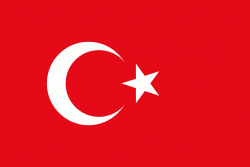Karadeniz Ereğli (Ereğli)
Karadeniz Ereğli (or Ereğli) is a city and district in Zonguldak Province of Turkey on the Black Sea shore. Population of the city proper is 121,237 as of 2020. The mayor of the city is Halil Posbıyık. Mehmet Yapıcı is the District Governor of Ereğli.
The city was a Greek city in ancient times known as Heraclea Pontica after the Greek mythical hero Heracles. The Turkish name Karadeniz Ereğli means "Black Sea Ereğli" (kara: "black", deniz: "sea" in Turkish), which distinguishes it from other places called Ereğli (the name Ereğli derives from Heraclea). It was founded by a Megarian colony, which soon subjugated the native Mariandynians and extended its power over a considerable territory. It was the birthplace of Heraclides Ponticus. According to Greek mythology, the cave guarded by the three-headed dog Cerberus is located near the town. For his final quest, Heracles is tasked with entering the cave and capturing Cerberus.
The prosperity of the city, rudely shaken by the Galatians and the Bithynians, was utterly destroyed in the Mithridatic Wars. Then, Heraclea Pontica was part of the (Eastern) Roman Empire for more than 1000 years. The Turks ravaged the area after the Battle of Mantzikert in 1071. David Komnenos, brother of the ruler of Trebizond Alexios I of Trebizond, took Heraclea Pontica in 1205 and made it capital of his domain, called Paphlagonia; he lost it in 1214 to Theodore I Laskaris, who made it a major frontier bulwark. The Genoese had a colony there after 1261. When the Turks conquered Paphlagonia in 1360, the Genoese bought the city from the weakening Byzantine Empire. Heraclea developed as a trading centre of the Genoese, who settled there in large numbers. A ruined citadel on a height overlooking the town is a remnant of this period. The Italian name of the city was Pontarachia. The Genoese held the city until the Ottomans captured it after 1453.
In the late 19th and early 20th century, Karadeniz Ereğli was part of the Kastamonu Vilayet of the Ottoman Empire.
The city was a Greek city in ancient times known as Heraclea Pontica after the Greek mythical hero Heracles. The Turkish name Karadeniz Ereğli means "Black Sea Ereğli" (kara: "black", deniz: "sea" in Turkish), which distinguishes it from other places called Ereğli (the name Ereğli derives from Heraclea). It was founded by a Megarian colony, which soon subjugated the native Mariandynians and extended its power over a considerable territory. It was the birthplace of Heraclides Ponticus. According to Greek mythology, the cave guarded by the three-headed dog Cerberus is located near the town. For his final quest, Heracles is tasked with entering the cave and capturing Cerberus.
The prosperity of the city, rudely shaken by the Galatians and the Bithynians, was utterly destroyed in the Mithridatic Wars. Then, Heraclea Pontica was part of the (Eastern) Roman Empire for more than 1000 years. The Turks ravaged the area after the Battle of Mantzikert in 1071. David Komnenos, brother of the ruler of Trebizond Alexios I of Trebizond, took Heraclea Pontica in 1205 and made it capital of his domain, called Paphlagonia; he lost it in 1214 to Theodore I Laskaris, who made it a major frontier bulwark. The Genoese had a colony there after 1261. When the Turks conquered Paphlagonia in 1360, the Genoese bought the city from the weakening Byzantine Empire. Heraclea developed as a trading centre of the Genoese, who settled there in large numbers. A ruined citadel on a height overlooking the town is a remnant of this period. The Italian name of the city was Pontarachia. The Genoese held the city until the Ottomans captured it after 1453.
In the late 19th and early 20th century, Karadeniz Ereğli was part of the Kastamonu Vilayet of the Ottoman Empire.
Map - Karadeniz Ereğli (Ereğli)
Map
Country - Turkey
 |
|
| Flag of Turkey | |
One of the world's earliest permanently settled regions, present-day Turkey was home to important Neolithic sites like Göbekli Tepe, and was inhabited by ancient civilisations including the Hattians, Hittites, Anatolian peoples, Mycenaean Greeks, Persians and others. Following the conquests of Alexander the Great which started the Hellenistic period, most of the ancient regions in modern Turkey were culturally Hellenised, which continued during the Byzantine era. The Seljuk Turks began migrating in the 11th century, and the Sultanate of Rum ruled Anatolia until the Mongol invasion in 1243, when it disintegrated into small Turkish principalities. Beginning in the late 13th century, the Ottomans united the principalities and conquered the Balkans, and the Turkification of Anatolia increased during the Ottoman period. After Mehmed II conquered Constantinople (Istanbul) in 1453, Ottoman expansion continued under Selim I. During the reign of Suleiman the Magnificent, the Ottoman Empire became a global power. From the late 18th century onwards, the empire's power declined with a gradual loss of territories. Mahmud II started a period of modernisation in the early 19th century. The Young Turk Revolution of 1908 restricted the authority of the Sultan and restored the Ottoman Parliament after a 30-year suspension, ushering the empire into a multi-party period. The 1913 coup d'état put the country under the control of the Three Pashas, who facilitated the Empire's entry into World War I as part of the Central Powers in 1914. During the war, the Ottoman government committed genocides against its Armenian, Greek and Assyrian subjects. After its defeat in the war, the Ottoman Empire was partitioned.
Currency / Language
| ISO | Currency | Symbol | Significant figures |
|---|---|---|---|
| TRY | Turkish lira | ₺ | 2 |
| ISO | Language |
|---|---|
| AV | Avar language |
| AZ | Azerbaijani language |
| KU | Kurdish language |
| TR | Turkish language |















